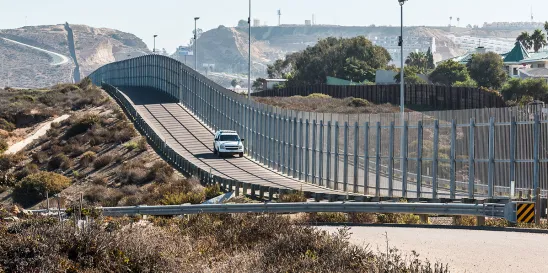Last week, Proskauer hosted a panel discussion focusing on the recent influx of migrants crossing the U.S. southern border and the urgent need for pro bono legal services. According to The New York Times, this past fiscal year nearly 2.5 million migrants crossed the U.S.-Mexico border, which is two and a half times greater than the number from four years ago. The large number of recent arrivals has overwhelmed an already strained system, as demonstrated by the current backlog of three million immigration cases — which has doubled since 2021 — pending before just 800 judges.
The panel was comprised of three immigration lawyers from Sanctuary For Families: Pooja Asnani, director of the Immigration Intervention Project; Maura Heron, supervising staff attorney for the Gender-Based Asylum Initiative; and staff attorney Alexi Jenkins. We were also privileged to have Alicia Berenyi, senior counsel in the Office of the Chief Counsel to the Mayor of New York City.
The panel provided an overview of recent conditions at the border and a detailed account of what migrants are facing as they flee persecution, war, gang violence, and economic distress in a wide host of countries. The panel also surveyed recent U.S. policy, including the introduction of an app that people seeking asylum can use to schedule appointments at the border. Although considered a step in the right direction, the app is difficult to navigate and inaccessible to a large number of people without internet access. We also were briefed on the tremendous efforts spearheaded by the Mayor’s Office in New York City to provide thousands of recent arrivals with pro se application assistance for immigration claims. Proskauer is proud to be part of the City’s effort and is working with Sanctuary to help victims of gender-based violence with asylum applications.
Observations
Migration through the southern border has increased dramatically since I visited Texas and Mexico in the two years leading up to the pandemic. The underlying challenges that I observed then, however, remain the same. We have an under-resourced and over-burdened immigration system that simply cannot process so many people and adjudicate their claims in a timely and effective manner. Providing people with a real pathway to immigration relief while they are outside of the United States will require additional resources and close coordination with other countries. Moreover, work authorization needs to be expanded. Currently, work authorization is not automatic, thereby putting the security of families and children at risk while placing an enormous burden on cities like New York to provide food and shelter for many thousands of people. Permitting authorized immigrants to enter this country to work right away would alleviate much of this strain.
While the number of migrants has increased in the last few years, the misplaced policy debate at the border has not changed. Most of the discussion surrounding this issue focuses on mitigating the “pull factors” (i.e., factors that draw people to the United States) by making it more difficult to obtain immigration relief. Too often missing from that conversation is consideration of the “push factors” (i.e., the difficult conditions in various countries, whether it be gang violence or political and economic instability) that are causing mass migration in the first place. Making matters worse, the number of countries where such push factors are a concern is growing. The recent wave of migration includes many from Honduras, El Salvador, and Guatemala (which were the main sources of migration at the southern border I observed years ago when I volunteered), but it also now includes a large number of people from countries such as Ecuador, Cuba, Venezuela, and Haiti, as well as several African countries — a development which appears to have been caused by an immigration crackdown by European countries. As long as these push factors go unaddressed, no change in U.S. immigration policy alone will be enough to stem the flow of people.
In short, when addressing the crisis at the border, we should focus on reforming and investing in our broken immigration system, but must do so without demonizing immigrants or compromising our values, including respect for the law and due process.



 />i
/>i

